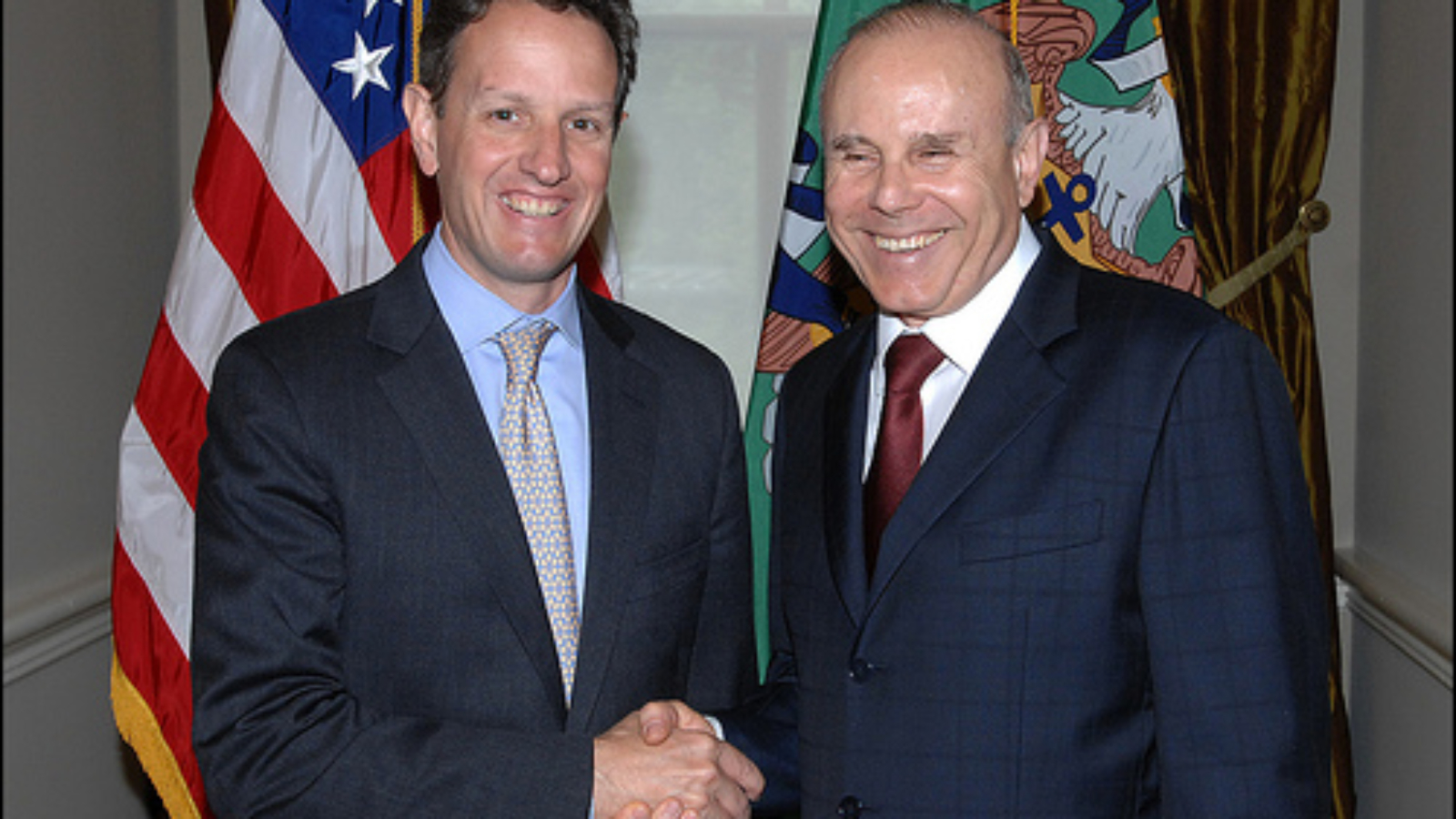Tim Geithner, Secretary of the US Treasury, and Guido Mantega, finance minister of Brazil
By David Black
What level of international discord over monetary policy qualifies as a currency war – and at what point does it begin to matter? In September, Guido Mantega, finance minister of Brazil, declared a currency war had flared up. He has since gone to lengths to vocally and regularly announce its escalation, though without much of a response from his Chinese and American counterparts, upon whom his accusations of unfairness center on.
Under Mantega, Brazil has become the self-appointed rhetorical leader of a group of emerging economies seeking to resolve a number of common problems they believe to be due to the behavior of developed countries’ central banks. Foremost among these problems, at least for Brazil, is the flow of hot money introduced by mostly rich-world investors seeking yields on these countries’ higher interest rates. This, Brazil contends, accounts for much of the rise the value of the real, unfairly compromising the competitiveness of exports and boosting domestic inflation.
In a talk at the World Policy Institute last Wednesday, Constance Hunter, the managing director and chief economist of Aladdin Capital Holdings, explained that while it is somewhat understandable that Mantega sees the US, China, and Europe as partly responsible for these grievances, just how responsible – and what he expects to be able do about this – are the better questions. At what point do his warnings, unaccompanied by a genuine retaliatory policy, come to be seen as impotent sabre-rattling? Brazil’s recent raise of tariffs on Chinese toys to 35%, part of a larger incremental strategy, has like previous tariffs failed to convince many that Mantega’s warnings are, as of yet, to be taken seriously. More alarming is speculation that Brazil might restrict currency inflows or begin tax short term debt, but until this happens it may be best to keep the situation in perspective and avoid the claim that recent skirmishes in monetary policy amount to a battle, let alone a war.
It is equally important to ask whether Mantega is correct to chalk up Brazil’s problems to American and Chinese monetary policy and behavior. Hunter says he is not, pointing to the fact that the Brazilian real is actually slightly weaker against the dollar now than it was when Lehman’s crash sparked the recession in 2008.
Indeed, many of Brazil’s problems are of its own making or the the result of relatively intractable macroeconomic . Much of the overheating in Brazil owes to its rapid growth from the global explosion of commodity prices – which is on the whole hardly something to complain about, largely beyond anyone’s control, and impossible to blame any other country for. Indeed, the demand behind this is fairly evenly distributed across the emerging world. And it would not be fair for Brazil to single out China for raising the value of the renminbi to help cover increased costs. Brazil, Hunter suggested, might accelerate its recent effort to examine what it can and even must do itself about its problems. The country's hefty budgets have until recently forced the central bank to fight its own government in an effort to control inflation. However, moves like the 50 billion reais cuts to the 2011 budget announced last Wednesday suggest that Brazil is coming to terms with some of the inevitable steps it must take.
Meanwhile, outside trends also suggest the so-called currency wars will fade. Persistent peripheral debt concerns mean the Euro will likely be the next currency to weaken. US treasury yields are moving higher with the recovery on track and the end in sight for the second round of quantitative easing.
In remarks made on a visit to Sao Paolo on February 7th, U.S. Secretary of the Treasury Timothy Geithner suggested politely that countries with large surpluses will see the depreciation they seek when they allow their currencies to “reflect fundamentals.” But one can say the US is hardly practicing the type of discipline Geithner must preach: the Fed, in coordination with Geithner and the treasury, pumped an estimated $900 trillion worth of stimulus into the US economy just two months ago and has made an aggressive push to buy US treasuries, now owning more than China. But, as Brazil might consider keeping in mind, the mandate of the Fed is not global and the US is emerging from a severe recession that did not touch Brazil. And despite the recession’s impact and mounting deficits, the US will remain for at least several years in a position that affords it greater latitude than Brazil.
So, can the currency volatility Brazil worries about be dampened? Not if the world is to retain free markets, says Hunter, and even then, all the major economies concerned would have to agree on a new and larger regulatory framework. Until then, individual acts of protectionism are to be expected, and so far they have not come even close to sparking "war." Brazil is posturing: its policies are not changing very much and the rest of the world seems has called its bluff.
David Black is an editorial assistant at World Policy Journal.
Photograph courtesy of US Treasury Department
